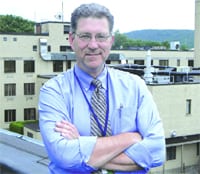Practical Tips for Aging Physicians
A
topic of increasing concern in the area of physician health is the aging physician population. According to a 2015 study by the Assoc. of American Medical Colleges, the physician population is aging, with 30{06cf2b9696b159f874511d23dbc893eb1ac83014175ed30550cfff22781411e5} over the age of 60. It is important that the physician health community respond to this trend.
Aging brings wisdom, experience, and mastery. Yet, aging may also bring new complications in performing our work with safety and skill. A recent conference hosted by the Rhode Island Medical Society titled “Senior Physicians: Addressing Age, Ability, and Acumen” addressed how healthcare systems are responding to cognitive and physical functioning in aging physicians. Panelists identified resources for assessment and maintenance of a healthy physician population. Additionally, a thoughtful discourse was presented on transitioning to retirement, which highlighted the benefits of planning ahead and finding fulfillment.
At Physician Health Services (PHS), a service of the Mass. Medical Society (MMS), I meet with physicians who express concerns that their health status may be impacting their work. They want to ensure they continue to practice safely. Here are some practical tips I have shared with them on signs of concern in the aging process and suggestions on where to go for help.
Signs of Early Dementia: Trouble with word finding is often a sign of normal aging. However, there are signs of dementia to look out for, including repeating stories without awareness; forgetting events and conversations that occurred; inability to retrieve words or names from memory (this is different than having a delay in word retrieval, as it indicates a memory is no longer accessible); losing track of time; and not recognizing or having concern about your memory problem.
Assessment: It is impossible for physicians to self-assess when it comes to memory impairment. Issues of confidentiality, shame, and fear can also interfere with obtaining a timely evaluation. However, if you are concerned about your memory, you deserve to be supported and receive early intervention.
Conducting a baseline test can help elucidate subtle changes in the future. PHS always recommends seeking advice from providers who have experience evaluating physicians whenever possible.
Recommendations to assess the problem include completing an adequate neurologic screen (it should be extensive, at least 30 minutes in duration, as a traditional mental status exam may yield false negatives); and completing neuropsychological testing to clarify a diagnosis. Understanding how you learn can help people understand how best to move forward with re-education, if necessary.
Preventing Dementia: Higher education is a protective factor, but there are other things physicians can do to actively prevent dementia:
• Maintain good physical health. Be proactive against obesity, hypertension, and diabetes. Lowering risk of cardiovascular disease can lower risk of dementia significantly.
• Avoid smoking. Smokers have a 45{06cf2b9696b159f874511d23dbc893eb1ac83014175ed30550cfff22781411e5} higher risk of developing dementia than non-smokers, according to a 2014 World Health Organization report. Quitting smoking later in life could also reduce the risk of dementia.
• Exercise. Brain cells may benefit from increased blood flow and oxygen, and cardiovascular risks will be reduced.
• Maintain a healthy diet. The Mediterranean diet (low fat, low sodium, and low sugar) has been shown to be beneficial in slower cognitive decline and lower risk of Alzheimer’s disease.
Transitioning to Retirement: Planning ahead for retirement helps the transition proceed more smoothly. Donna Singer, a consultant and coach to physicians, speaks of having “meaning, passion, and purpose” in retirement. There are many resources available to help physicians consider areas of transition and set goals for retirement, including the Physician Practice Resource Center’s MMS Guide to Practice Transition or Retirement, available on the MMS website at www.massmed.org/practice-



Comments are closed.